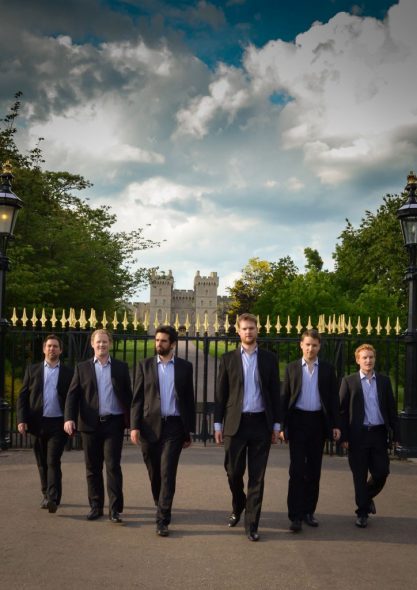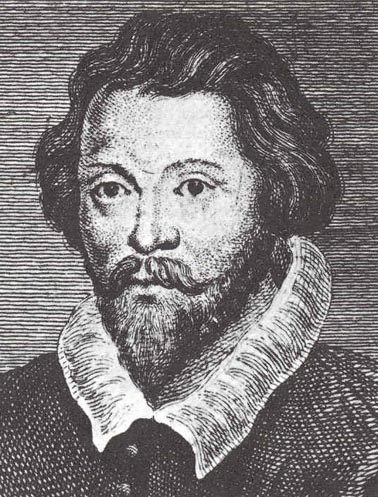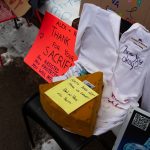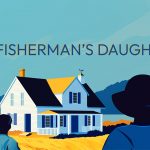Greatest Hits of the Old Brits
The Queen's Six performs such English Renaissance composers as Byrd, Tallis, Gibbons.
Early Music Now presents an a capella men’s group with royal credentials as the final concert of the season this Saturday evening. The Queen’s Six will offer a program of the “Sacred & Profane: Music of the Tudor and Jacobean Courts.” The concert recognizes the six accomplished English composers of late Renaissance – William Byrd, Thomas Tallis, Orlando Gibbons, Thomas Morely, Thomas Weelkes and Thomas Tompkins. This was a turbulent time in England as the Church of England founded by Henry VIII struggled for ascendancy with English advocates for the Roman Catholic Church. Both the churches and the monarchs – Elizabeth I and James I – were important patrons of these composers. Both sacred and secular music flourished among the court society of the time; to an extent arguably not reached again in England until the 20th century.
The Queen’s Six (singers Daniel Brittain, Tim Carleston, Nick Madden, Dominic Bland, Andrew Thompson and Simon Whitely) serve as professional adult singers for St. George’s Chapel, housed within the walls of Windsor Castle. These singers created The Queen’s Six in 2008 as an independent performing group. Aside from occasional Chapel services attended by today’s Queen Elizabeth, the queen they honor is Elizabeth I, who ascended to the throne 460 years ago.
Western classical music at the time was dominated by Italian innovation. Given the renewed recognition of the importance of words in choral composition, it was appropriate that English composers would write and revise material rooted in Italian styles, but with English texts. Some works are settings of English poets; others translations of biblical sources previously in Latin, or poets whose works had swept the continent.
Renaissance sacred music tended to present expansive lines – short texts within complex polyphonic part song. Secular music was most often presented as madrigals: fully developed poetry expressing idealized romance, bestowing unfettered praise or commenting on the trials of life and death. The most prolific of the the composers, William Byrd, was also caught up in the tension between the Church of England and often rebellious Roman Catholics. He wrote much sacred music in Latin and was unafraid to slip seditious elements into the texts of his works. But the quality of his writing and his political skill allowed him to maintain good standing with the Protestant court.
But what matters most is the music. Part songs for six voices were common in the Renaissance. (Others for seven or even 40 parts are beyond the repertory of the Queen’s Six.) Early music choral work calls for a specific approach. “The music makes you think in different ways about singing and performing,” Whiteley observes. “Harmony in polyphony is somewhat incidental. It’s something the voices do as they ebb and flow. The music has “peaks and troughs. The peaks are where the interesting harmonics happen.”
By contrast when the group sings “California Dreaming” or “Mrs. Otis Regrets” — which may be performed at other stops on this premier United States tour — the style changes. That music requires a focused attention by the ensemble to nuances of dynamic and pitch. The ensemble must focus on the whole rather than the parts. “Byrd and Tallis understood how the music works,” Whitely concludes. “You don’t really need to think so much about dynamics or how your voices blend. We let the music do that itself.”
What the music does for itself can be a spectacular aural experience. Stephen Pritchard, reviewer for The Guradian observed that “the close musical rapport that develops when six men sing together every day, as the Queen’s Six do, brings seamless blend and balance to the music.” Whatever may explain why English composition was less accomplished in the decades after this period, we can celebrate a creative peak in English musical life in this period of enlightened royal courts.
The Queen’s Six will perform at 5:00 p.m. on April 14 at Saint Joseph Chapel at the 1501 S. Layton Blvd.. A pre-talk is scheduled to begin at 4:00 p.m. Parking is available in the lot behind the building, accessed at 29th and Orchard, and on the street. Tickets may be purchased online or at 414-225-3113. Available tickets for tiers 2 and 3 are $29 and $46; students $10 and $15.
The program is also online.
Preview
-
A Sacred Choir, 70 Voices Strong
 Dec 14th, 2025 by Martha Brown
Dec 14th, 2025 by Martha Brown
-
Prometheus Trio Goes Bohemian
 Dec 3rd, 2025 by Martha Brown
Dec 3rd, 2025 by Martha Brown
-
Present Music Offers New Choral Works
 Nov 20th, 2025 by Michael Barndt
Nov 20th, 2025 by Michael Barndt






















